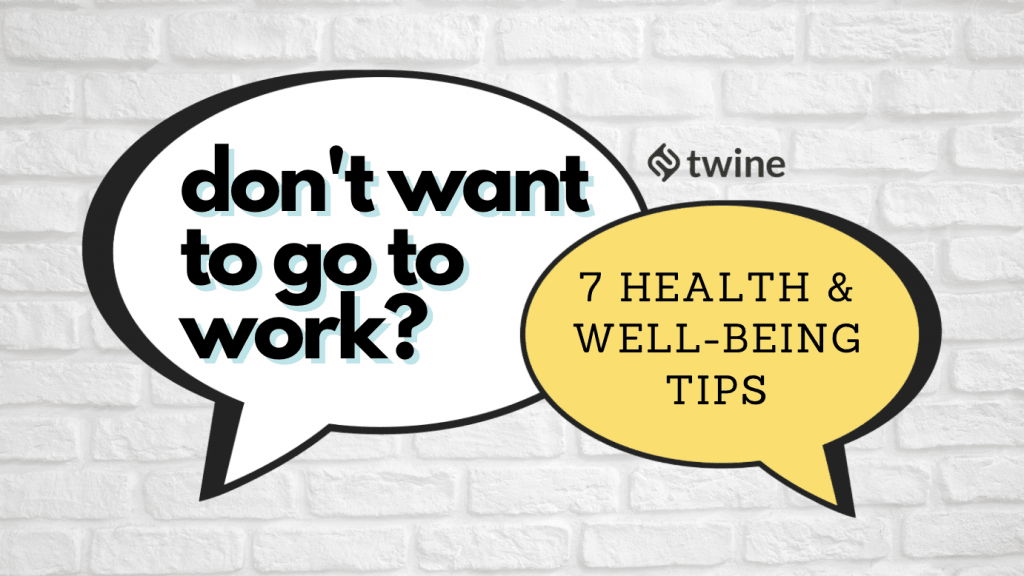
I really don’t wanna do the work today.
There are times when we all fear going to work and this might be an indication of stress, poor health, and wellbeing. So, what should you do when stepping out of home feels like the most challenging thing ever? When you just don’t want to go to work?
Is there any escape route?
In this post, we have answered this and many other questions popping into your head. Scroll down to begin a transformation journey that will turn your exhausting work life into a fascinating experience.
#1. What is health & wellbeing?
Physical and mental factors combined give the concept of health and wellbeing. Holistically speaking, your intellectual level, emotional stability, physical fitness, and social interactions influence health and wellbeing.
Since there are various driving factors, a slight change in your life can significantly affect you. It includes your work life as well. If you are working under high-pressure conditions, your health & wellbeing will be affected adversely.
Consequently, poor health and wellbeing will water down your productivity and efficiency.
#2. Change your environment

A toxic environment is one of the most substantial contributors to your lack of motivation towards work. A few ingredients to a stressful work environment are:
- Working overtime
- Carrying work stress to home
- Trading family commitments for work
- Lacking workplace satisfaction
- Economic insecurity
Identifying the problems in your surroundings is the first step to improving your health and wellbeing.
Next, try discovering what’s compelling you to stay at home. Do you want to spend some quality time with your family? Is it simply because you want to take some days off? Or is there anything problematic at your workplace? Think about it and identify the core issues.
Once done, decide on the sound options to reach a solution and how you can integrate them into your life.
#3. Setting boundaries
Those extra hours of work you spend every day at the office have probably made you say or at least think that “I don’t want to go to work anymore.” The reason is simple, your mind is exhausted, and it’s crying out loud for a break.
Out of the many ways to improve mental health, maintaining a balance between work and personal life is crucial. And the good news is — it is completely achievable! Here’s how:
- Do the calculations, and commit your employer the amount of work you are capable of doing during working hours/days
- Manage some personal time every day
- Take a few days off bi-annually or annually to do whatever you have been longing for
#4. Smarter, not harder

Though there’s nothing bad in struggling to out-compete others, trading your health for the goal is troublesome. Are you a proponent of rise & grind culture? Or have you been staying late at night to prove yourself a competitive worker?
Sleep deprivation, stress, depression, migraine, and many other issues have emerged in those who suffer mentally and physically at work. This can happen whether you’re an in-office employee, or someone working remotely.
If you are following the same path, you might need to redefine the definition of a successful career. Consider the things you enjoy doing and incorporate them into your work life. And if your job doesn’t provide them, what’s stopping you from trying out some better options?
#5. Be present
Working without any direction leaves no excitement in life. So, to keep your interest alive set weekly or monthly goals. Practicing short mindfulness exercises like deep breathing, reading books, stretching, and journaling are also known to enhance mental clarity and work quality.
In addition, doing one task at a time rather than being a multi-tasker is another good practice to remain focused.
#6. Feel gratitude

No one knows the answer to “how to make yourself feel good” other than yourself. Look what enjoyable factors you find in your job and recall them the next time you feel worn out.
Practice being thankful for all you have. You have a job, a good relationship with co-workers, a handsome salary, a set of skills, a family, and the list goes on.
On the contrary, many people don’t have these blessings to count. Therefore, remain grateful, and take the challenges as nothing but an opportunity to learn.
#7. Allow yourself to grow
“While your past experiences most definitely influence your present reality, you can learn from and release the past and consciously choose a healthier and happier course forward through professional counseling or coaching support,”
says psychotherapist and self-care expert Lynn Louise Wonders, MA, LPC.
If you have recently found something more captivating, don’t hesitate to learn about that skill. Don’t get afraid of failing, as there’s always room for improvement.
Pursuing a growth mindset rather than a fixed mindset and remaining optimistic are mental health tips that will never make you feel demotivated or discouraged.
Takeaways
Not wanting to go to work is normal, but leaving the question “why I don’t want to go to work?” unanswered will surely muddy the waters.
If things get more demanding, consider outsourcing the extra tasks on websites like Twine. Remain grateful, and keep learning! These steps help you leave no stone unturned while struggling to make your work life enjoyable.
Ready to get hired? At Twine, we have dozens of top-quality jobs being posted each and every day. From design to marketing, development to copywriting – there’s a job ready for your skills. Join the marketplace of diverse creative talent here.



